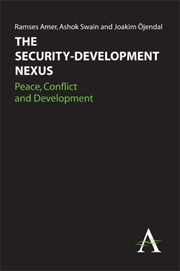Book contents
- Frontmatter
- Contents
- List of Tables and Figures
- List of Editors and Contributors
- Acknowledgements
- Chapter 1 Researching the Security-Development Nexus through a Multi-disciplinary Approach
- Chapter 2 Exploring the Security-Development Nexus
- Chapter 3 Liberal State-Building and Environmental Security: The International Community between Trade-Off and Carelessness
- Chapter 4 The Rising China and Maintaining the International Order: Some Reflections
- Chapter 5 Non-use of Force, Non-interference and Security: The Case of Pacific Asia
- Chapter 6 International Dimensions of Peace Processes in Aceh and Sri Lanka: The Role of Intermediaries in the 2000s
- Chapter 7 The Challenges of Human Security and Development in Central Asia
- Chapter 8 Diasporas' Role in Peacebuilding: The Case of the Vietnamese-Swedish Diaspora
- Chapter 9 Tracing Minerals, Creating Peace: The Security-Development Nexus in the DRC
- Chapter 10 Water Management and the Security-Development Nexus: The Governing of Life in eThekwini Municipality, South Africa
Chapter 10 - Water Management and the Security-Development Nexus: The Governing of Life in eThekwini Municipality, South Africa
Published online by Cambridge University Press: 05 June 2012
- Frontmatter
- Contents
- List of Tables and Figures
- List of Editors and Contributors
- Acknowledgements
- Chapter 1 Researching the Security-Development Nexus through a Multi-disciplinary Approach
- Chapter 2 Exploring the Security-Development Nexus
- Chapter 3 Liberal State-Building and Environmental Security: The International Community between Trade-Off and Carelessness
- Chapter 4 The Rising China and Maintaining the International Order: Some Reflections
- Chapter 5 Non-use of Force, Non-interference and Security: The Case of Pacific Asia
- Chapter 6 International Dimensions of Peace Processes in Aceh and Sri Lanka: The Role of Intermediaries in the 2000s
- Chapter 7 The Challenges of Human Security and Development in Central Asia
- Chapter 8 Diasporas' Role in Peacebuilding: The Case of the Vietnamese-Swedish Diaspora
- Chapter 9 Tracing Minerals, Creating Peace: The Security-Development Nexus in the DRC
- Chapter 10 Water Management and the Security-Development Nexus: The Governing of Life in eThekwini Municipality, South Africa
Summary
Introduction
During the last decades water has increasingly become a critical issue in global and local governance, raising questions about human and environmental security and about states' and individuals' right to freshwater and to development. Recently, after 15 years of debate, the United Nations assembly agreed to define access to clean water as a human right (UN 2010a).
The challenges in global water governance include a shrinking availability of water per capita due to pollution, population growth, urbanization and industrialization, a problem that is further amplified by the unpredictability of climate change. At the same time there is an urgent need to reduce the proportion of people living without access to safe drinking water. Water issues have increasingly been recognized as a global concern, and a consensus has emerged for a more conservationist approach in water management and for changing our perceptions and handling of water resources. These efforts are developed under the heading ‘Integrated Water Resource Management’ (IWRM) and are set to promote a management of water that is more efficient, equitable and sustainable – values that constitute the core of IWRM.
This chapter aims to discuss global water issues in relation to ‘development’, ‘security’, and the ‘security-development nexus’ and to explore, through a biopolitical lens, how water management in an IWRM regime can be understood as a technique of governing subjects, life and lifestyles. To illuminate this, I will draw on research findings from the eThekwini municipality in South Africa.
- Type
- Chapter
- Information
- The Security-Development NexusPeace, Conflict and Development, pp. 205 - 228Publisher: Anthem PressPrint publication year: 2012
- 1
- Cited by



